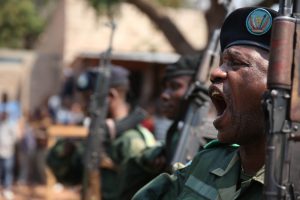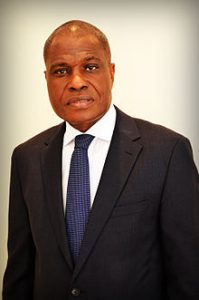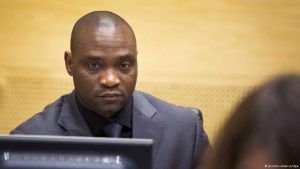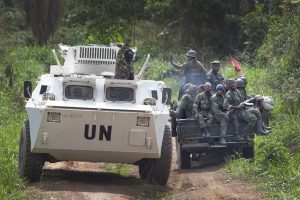DR CONGO DIGEST – FEB 2016
POLITICS | ARMED CONFLICT | ECONOMY / MINING /NATURAL RESOURCES | SOCIETY
 SUMMARY. As concerns that President Joseph Kabila will not step down in December when his constitutionally mandated time in office is over mount, opposition groups and political activists continue to increase pressure on the Kabila government to stand down and ensure a free and fair election. Meanwhile, The Citizen Front 2016 Coalition and other groups coordinate a one-day general strike in Kinshasa, or “ville morte”, to protest delays in organizing presidential elections on schedule. On or around the general strike, Congolese security forces detained a number of youth activists and dozens of political opposition supporters. Activists, NGOs, and the US State Department all express concern, calling on the government to respect the freedoms enshrined in its own constitution and immediately release those individuals and groups being detained.
SUMMARY. As concerns that President Joseph Kabila will not step down in December when his constitutionally mandated time in office is over mount, opposition groups and political activists continue to increase pressure on the Kabila government to stand down and ensure a free and fair election. Meanwhile, The Citizen Front 2016 Coalition and other groups coordinate a one-day general strike in Kinshasa, or “ville morte”, to protest delays in organizing presidential elections on schedule. On or around the general strike, Congolese security forces detained a number of youth activists and dozens of political opposition supporters. Activists, NGOs, and the US State Department all express concern, calling on the government to respect the freedoms enshrined in its own constitution and immediately release those individuals and groups being detained.
On the security front, the Congolese government brings new charges against infamous warlord Germain Katanga, who had been scheduled to leave prison in January following an ICC sentence. Multiple incidents of ethnic violence have been reported this month, as tensions between Hutu and Nande ethnic groups flare. UN peacekeepers from the DR Congo face allegations and charges of rape and sexual exploitation, while leaked UN Security Council documents point to a lack of trust between MONUSCO and its Congolese partners.
POLITICS
DR Congo: Opposition parties urge population to paralyse the country on 16 February
The Citizen Front 2016 Coalition, which includes Lucha and the G7 opposition grouping, have called for a day of ‘ville mortes’ (dead cities) throughout DR Congo on February 16 to demand President Joseph Kabila step down and commemorate the country’s ‘martyrs of democracy’. Since January, opposition parties and activists have been calling for mass protests against a draft law that would let Kabila extend his rule past a constitutionally mandated two term limit that ends in December 2016. Other parties calling for the day of action include pro-democracy Filimbi youth movement and the Dynamique de l’Opposition, as well a number of civil society organizations such as the African Association for the Defence of Human Rights (ASADHO). (FULL ARTICLE | IB Times. February 10 2016)
DR Congo party leader arrest raises tensions ahead of strike
 The brief arrest of opposition leader Martin Fayulu, leader of the small ECIDE party, has raised tensions ahead of a planned general strike called by opponents of President Joseph Kabila. His lawyer says Fayulu was not “arrested” but “kidnapped” by security agents of the Military Detection of Anti-National Activities service, and claims that he was beaten and is now considering taking legal action. Fayulu’s ECIDE is part of an opposition coalition whose members signed a call for a nationwide general strike on Tuesday to press Kabila to step down when his mandate expires at the end of the year. According to sources, Fayulu was arrested for “inciting violence against public order”. His case will be heard in parliament. (FULL ARTICLE | Al Jazeera English. February 15 2016)
The brief arrest of opposition leader Martin Fayulu, leader of the small ECIDE party, has raised tensions ahead of a planned general strike called by opponents of President Joseph Kabila. His lawyer says Fayulu was not “arrested” but “kidnapped” by security agents of the Military Detection of Anti-National Activities service, and claims that he was beaten and is now considering taking legal action. Fayulu’s ECIDE is part of an opposition coalition whose members signed a call for a nationwide general strike on Tuesday to press Kabila to step down when his mandate expires at the end of the year. According to sources, Fayulu was arrested for “inciting violence against public order”. His case will be heard in parliament. (FULL ARTICLE | Al Jazeera English. February 15 2016)
General strike stops most economic activity in DR Congo capital
A planned one-day general strike shut down most businesses in DR Congo’s capital on Tuesday, raising pressure on President Joseph Kabila to quit power when his mandate ends this December. Streets were largely deserted and facilities closed, with government offices in Kinshasa operating at less than half capacity, as many workers were unable to find proper transport. Opposition leaders have hailed the strike as a successful first step toward forcing Kabila’s departure, but others remain cautious about its impact. Meanwhile, authorities arrested six members of the Lucha activist group in Goma and another in Kinshasa, as well as a member of the opposition UNC party in Uvira. There are no confirmed reports of violence. (FULL ARTICLE | Reuters. February 16 2016)
Exercise of the Right to Freedom of Expression in DR Congo
The United States (US) is troubled by the harassment ‘by the harassment and detention of peaceful activists and opposition leaders’ in DR Congo, including those detained in connection with the recent general strike. The US raises concerns with DR Congo authorities, and call on the government to respect the freedoms enshrined in its own Constitution. The US also calls on the DR Congo to honor its international human rights obligations and immediately release all those being detained. Arbitrary detentions stifle the free expression of diverse viewpoints, contributing to a closing of political space while undermining the credibility Joseph Kabila’s government. (FULL STATEMENT | US Department of State. February 18 2016)
DR Congo: Youth Activists Rounded Up at Strike
DR Congo has arbitrarily arrested eight youth activists and 30 political opposition supporters, Human Rights Watch reports. The activists and supporters were detained on or around February 16, in connection with the “ville morte” national strike, to protest delays in organizing presidential elections. Other activists who supported the ville morte have received text message threats from unknown phone numbers. “Peaceful protest is not a crime, and the Congolese authorities should immediately release all those wrongfully arrested or detained on trumped up charges,” says Human Rights Watch. The ville morte was largely observed in Kinshasa, with schools, shops, and businesses closed, and streets largely empty, despite government officials’ efforts to make it a normal day. (FULL STATEMENT | Human Rights Watch. February 23 2016)
Leading DR Congo activist Fred Bauma calls for EU intervention over jailing of political activists
Prominent Congolese political activist Fred Bauma urges EU nations to reconsider how they fund reforms of the justice system in DR Congo following the sentencing of six youth Lucha activists to two years in jail after their arrest on February 16 prior to the villes-morte general strike. Lucha activists claim the corrupt system does not allow equitable trial to prisoners detained in DR Congo, despite the fact the country has been receiving vast resources and funding from the EU and United Nations in a reform project dubbed ‘PARJE-Uhkai Safi’. Between 2008 and 2012, the body funded a $17 billion assistance package to the DR Congo to reform institutions like its judiciary. Bauma claims the EU, through its financial aid, is indirectly supporting an unaccountable and repressive system in the country, and calls for EU nations to take action. Bauma is a leader of Lucha who has been illegally imprisoned since March 2015. (FULL ARTICLE | IB Times. February 26 2016)
ARMED CONFLICT
DR Congo prosecutes warlord Katanga convicted by ICC
 Militia commander Germain Katanga, previously scheduled to leave prison in January after serving the term handed down by the ICC at The Hague, is to face trial in DR Congo over new charges over killing UN peacekeepers in 2005. The ICC had already sentenced Katanga to war crimes, mostly connected to a 2003 raid which killed some 200 people during the Second Congo War, where it had been determined Katanga supplied weapons to his FPRI militia. Although due for release, DR Congo authorities refuse to set Katanga free, claiming he has been implicated in many other cases during Congo conflicts. (FULL ARTICLE | Deutsche Welle. February 3 2016)
Militia commander Germain Katanga, previously scheduled to leave prison in January after serving the term handed down by the ICC at The Hague, is to face trial in DR Congo over new charges over killing UN peacekeepers in 2005. The ICC had already sentenced Katanga to war crimes, mostly connected to a 2003 raid which killed some 200 people during the Second Congo War, where it had been determined Katanga supplied weapons to his FPRI militia. Although due for release, DR Congo authorities refuse to set Katanga free, claiming he has been implicated in many other cases during Congo conflicts. (FULL ARTICLE | Deutsche Welle. February 3 2016)
A leaked report calls into question UN support for the Congolese Army after two UN peacekeepers killed
A week ago, UN peacekeepers struck a deal with the Congolese government to restart joint operations against the Rwandan FDLR rebels, a seeming victory for the UN. Now, a report leaked from the UN Group of Experts on the DR Congo suggests that Congolese troops may have killed two United Nations peacekeepers after civilians accused the Tanzanian UN troops of providing supplies to Uganda’s Allied Democratic Forces (ADF) rebels in east Congo. The report also suggests that the Congolese army may have attacked the UN peacekeepers because they suspected them of selling weapons to the ADF. The UN’s work in eastern DR Congo has been long affected by poor relations with its Congolese partners. (FULL ARTICLE | Congo Research Group. February 4 2016)
At least 21 Hutus killed in ‘alarming’ east DR Congo violence: UN
At least 21 people were killed, 40 wounded and dozens of houses burned in weekend attacks aimed at Hutus in eastern DR Congo, a sign of intensive ethnic tension and violence in the country. The attacks are the latest in a series of conflict between Hutus and other local groups, and have intensified since January when the FDLR, a Rwandan Hutu militia operating in eastern DR Congo, was accused by authorities of killing 14 ethnic Nande in North Kivu. The UN says Nande-dominated UPDI and the Nyanga-dominated NDC carried out the most recent attacks. Tensions have spiked between the Hutu and neighboring communities since Congo’s army launched a military offensive against the FDLR last year, displacing many fighters and Hutu civilians. (FULL ARTICLE | Reuters. February 8 2016)
International Red Hand Day: MONUSCO committed to ending recruitment of child soldiers into armed groups
MONUSCO points out that the objective of the celebration of ‘International Red Hand Day’ is to rise public awareness on the suffering faced by child soldiers around the world and in DR Congo. “Fourteen years have passed since the adoption, on 12 February 2002, of the Provisional Protocol to the Convention on the Rights of the Child in the context of armed conflict. The Government of the DRC has made significant progress towards ending the recruitment of children into the armed forces and impunity,” the statement says. During the year 2015 alone, at least 2 045 children have been separated from armed groups, including 488 freshly recruited. MONUSCO remains committed to end the recruitment of child soldiers into armed groups. (FULL STATEMENT | MONUSCO. February 12 2016)
Congo Rebels Killed 6 and Kidnapped 14, Group Says
Rebels in a northeastern area of DR Congo killed six civilians and kidnapped 14 others. A statement from an activist group blamed the Allied Democratic Forces (ADF), a Ugandan rebel group that has killed at least 500 people since ramping up attacks in the region in October 2014. The group is made up of Islamist extremists and wants to establish Sharia law in Uganda. (FULL ARTICLE | New York Times. February 13 2016)
UN Peacekeepers accused of rape in Central African Republic

UN peacekeepers, from the Republic of Congo and DR Congo, raped or sexually exploited at least eight women and girls in fall 2015 in CAR, according to Human Rights Watch. Allegations of rape by peacekeepers have mounted in CAR, with about 10 international peacekeeping contingents now implicated in cases of sexual abuse. Human Rights Watch calls on the UN to insist that troops’ home countries prosecute the crimes and take responsibility for helping survivors. (FULL ARTICLE | New York Times. February 14 2016)
ECONOMY
DR Congo Posts Budget Deficit as Lower Metal Prices Cut Revenue
The DR Congo posted a budget deficit of $205 million last year after declining prices for copper and other key exports hurt revenue. DR Congo, Africa’s biggest copper producer and largest miner of cobalt, said it expected a 14 percent fall in budgeted revenue this year. DR Congo’s foreign-exchange reserves have slumped to $1.38 billion from $1.65 billion at the end of 2014, and the country has lowered its growth forecast for 2015 to 7.7 percent. The 2016 budget predicts a growth rate of 9 percent. (FULL ARTICLE | Bloomberg. February 2 2016)
Orange to acquire Millicom subsidiary in DR Congo
Orange and Millicom have signed an agreement leading to Orange’s acquisition of Millicom’s operations in DR Congo. DR Congo is currently the largest mobile market in Central and West Africa after Nigeria, with more than 40 million subscribers. Through the deal, Orange significantly reinforces its presence in DR Congo. The acquisition underlines Orange’s strategy in Africa, which aims at ‘developing and maintaining leading competitive positions across its various countries of operations on the continent’. (FULL ARTICLE | BizTech Africa. February 8 2016)
DR Congo Still Plans to Change Mining Code
DR Congo says it still plans to change the country’s mining code, in a retreat from comments made by the department’s minister earlier this week. Mines Minister Martin Kabwelulu said this week the government had decided to maintain the country’s 2002 mining code due to the impact of low copper prices on the sector, abandoning a previous plan to revise the legislation. Now, his Chief of Staff says a new draft mining code is still with parliament, and could progress ‘at any time’. A draft of the revised laws approved by the government in March aimed to increase the state’s share of benefits from mining. (FULL ARTICLE | Africa News. February 12 2016)
DR Congo’s Central Bank Says It Will Take Steps to Support Currency
The central bank of DR Congo says it is taking steps to stop a slide in the country’s currency, the franc, and called on the government to help with additional measures. The official exchange rate moved above 930 francs for the first time, rising as high as 933 per dollar. DR Congo is battling a commodities slump that is weighing on its $33 billion economy, as prices for key exports such as copper and oil declined. The central bank increased reserve requirements for commercial banks on Congolese franc deposits and said it will boost immediate availability of dollars through sales of foreign currency. (FULL ARTICLE | Bloomberg. February 25 2016)


